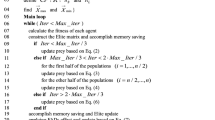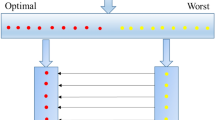Abstract
The marine predators algorithm (MPA) is a metaheuristic algorithm for solving optimization problems. MPA divides the whole optimization process into three phases evenly, and each phase corresponds to a different search agent update strategy. Such a setup makes MPA inflexible when facing different optimization problems, which affects the optimization performance. In this paper, we propose a novel modified MPA hybridizing by Q-learning (QMPA), which applies reinforcement learning to the selection of update strategy, and selects the most appropriate position update strategy for search agents in different iteration stages and states. It can effectively compensate for the deficiency of MPA's adaptive ability when facing different optimization problems. The performance of QMPA is tested on classical benchmark functions, the CEC2014 test suite, and engineering problems. In the classical benchmark functions test, QMPA is compared with MPA in 10, 30, and 50 dimensions. QMPA performs better than MPA for seven of the ten functions when the dimension is 10 and 30. The results of dimension 50 show that QMPA outperforms MPA in 5 functions and is close to it in 4 functions. Then, comparing QMPA with algorithms such as grey wolf optimizer, particle swarm optimization, slime mould algorithm, sine cosine algorithm, reptile search algorithm, and aquila optimizer, the results show that QMPA has the best performance on 22 of the total 30 functions in the CEC2014 test suite. Finally, QMPA is tested on two commonly used real-world engineering problems and gives the most optimal results. In general, the adaptive update strategy proposed in this paper improves the optimization performance of the MPA algorithm in terms of convergence and stability.












Similar content being viewed by others
Data availability
The data supporting the findings of this study can be obtained from the corresponding author upon reasonable request.
References
Dokeroglu T, Sevinc E, Kucukyilmaz T, Cosar A (2019) A survey on new generation metaheuristic algorithms. Comput Ind Eng. https://doi.org/10.1016/j.cie.2019.106040
Agrawal P, Abutarboush HF, Ganesh T, Mohamed AW (2021) Metaheuristic algorithms on feature selection: a survey of one decade of research (2009–2019). IEEE Access 9:26766–26791. https://doi.org/10.1109/ACCESS.2021.3056407
Faramarzi A, Heidarinejad M, Mirjalili S, Gandomi AH (2020) Marine predators algorithm: a nature-inspired metaheuristic. Expert Syst Appl. https://doi.org/10.1016/j.eswa.2020.113377
Wolpert DH, Macready WG (1997) No free lunch theorems for optimization. IEEE Trans Evol Comput 1(1):67–82. https://doi.org/10.1109/4235.585893
Li Y, Zhao L, Zhou S. Review of genetic algorithm. Materials science and engineering, PTS 1-22011. p 365–7
Storn R, Price K (1997) Differential evolution—a simple and efficient heuristic for global optimization over continuous spaces. J Global Optim 11(4):341–359. https://doi.org/10.1023/A:1008202821328
Hwang C-R (1988) Simulated annealing: theory and applications. Acta Appl Math 12(1):108–111. https://doi.org/10.1007/BF00047572
Rashedi E, Nezamabadi-Pour H, Saryazdi S (2009) GSA: a gravitational search algorithm. Inf Sci 179(13):2232–2248. https://doi.org/10.1016/j.ins.2009.03.004
Poli R, Kennedy J, Blackwell T (2007) Particle swarm optimization. Swarm Intell 1(1):33–57. https://doi.org/10.1007/s11721-007-0002-0
Mirjalili S, Mirjalili SM, Lewis A (2014) Grey wolf optimizer. Adv Eng Softw 69:46–61. https://doi.org/10.1016/j.advengsoft.2013.12.007
Al-qaness MAA, Ewees AA, Fan H, Abualigah L, Abd Elaziz M (2020) Marine predators algorithm for forecasting confirmed cases of COVID-19 in Italy, USA, Iran and Korea. Int J Environ Res Public Health. https://doi.org/10.3390/ijerph17103520
Hu G, Zhu X, Wei G, Chang C-T (2021) An improved marine predators algorithm for shape optimization of developable Ball surfaces. Eng Appl Artif Intell. https://doi.org/10.1016/j.engappai.2021.104417
Soliman MA, Hasanien HM, Alkuhayli A (2020) Marine predators algorithm for parameters identification of triple-diode photovoltaic models. IEEE Access 8:155832–155842. https://doi.org/10.1109/access.2020.3019244
Xing Z, He Y (2021) Many-objective multilevel thresholding image segmentation for infrared images of power equipment with boost marine predators algorithm. Appl Soft Comput. https://doi.org/10.1016/j.asoc.2021.107905
Li X-L, Serra R, Olivier J (2022) A multi-component PSO algorithm with leader learning mechanism for structural damage detection. Appl Soft Comput. https://doi.org/10.1016/j.asoc.2021.108315
Khan NH, Jamal R, Ebeed M, Kamel S, Zeinoddini-Meymand H, Zawbaa HM (2022) Adopting scenario-based approach to solve optimal reactive power dispatch problem with integration of wind and solar energy using improved marine predator algorithm. Ain Shams Eng J. https://doi.org/10.1016/j.asej.2022.101726
Houssein EH, Emam MM, Ali AA (2022) An optimized deep learning architecture for breast cancer diagnosis based on improved marine predators algorithm. Neural Comput Appl. https://doi.org/10.1007/s00521-022-07445-5
Sowmya R, Sankaranarayanan V (2022) Optimal vehicle-to-grid and grid-to-vehicle scheduling strategy with uncertainty management using improved marine predator algorithm. Comput Electr Eng. https://doi.org/10.1016/j.compeleceng.2022.107949
Sun C-J, Gao F (2021) A tent marine predators algorithm with estimation distribution algorithm and gaussian random walk for continuous optimization problems. Comput Intell Neurosci. https://doi.org/10.1155/2021/7695596
Hassan MH, Yousri D, Kamel S, Rahmann C (2022) A modified Marine predators algorithm for solving single- and multi-objective combined economic emission dispatch problems. Comput Ind Eng. https://doi.org/10.1016/j.cie.2021.107906
Yousri D, Abd Elaziz M, Oliva D, Abraham A, Alotaibi MA, Hossain MA (2022) Fractional-order comprehensive learning marine predators algorithm for global optimization and feature selection. Knowl Based Syst. https://doi.org/10.1016/j.knosys.2021.107603
Harifi S, Mohammadzadeh J, Khalilian M, Ebrahimnejad S (2021) Hybrid-EPC: an emperor penguins colony algorithm with crossover and mutation operators and its application in community detection. Progr Artif Intell 10(2):181–193. https://doi.org/10.1007/s13748-021-00231-9
Kangah JK, Appati JK, Darkwah KF, Soli MAT (2021) Implementation of an H-PSOGA optimization model for vehicle routing problem. Int J Appl Metaheuristic Comput 12(3):148–162. https://doi.org/10.4018/IJAMC.2021070106
Sheng W, Shao Q, Tong H, Peng J (2021) Scheduling optimization on takeout delivery based on hybrid meta-heuristic algorithm. In: 2021 13TH International Conference on Advanced Computational Intelligence (ICACI)2021. p 372–7
Cimen ME, Yalcin Y (2022) A novel hybrid firefly-whale optimization algorithm and its application to optimization of MPC parameters. Soft Comput 26(4):1845–1872. https://doi.org/10.1007/s00500-021-06441-6
Almadhor A, Rauf HT, Khan MA, Kadry S, Nam Y (2021) A hybrid algorithm (BAPSO) for capacity configuration optimization in a distributed solar PV based microgrid. Energy Rep 7:7906–7912. https://doi.org/10.1016/j.egyr.2021.01.034
Panagant N, Yildiz M, Pholdee N, Yildiz AR, Bureerat S, Sait SM (2021) A novel hybrid marine predators-Nelder-Mead optimization algorithm for the optimal design of engineering problems. Mater Test 63(5):453–457. https://doi.org/10.1515/mt-2020-0077
Li S-F, Cheng C-Y (2017) Particle swarm optimization with fitness adjustment parameters. Comput Ind Eng 113:831–841. https://doi.org/10.1016/j.cie.2017.06.006
Shen X, Zou D, Zhang X. A self-adaptive differential evolution with dynamic selecting mutation strategy. 2017 International Conference on Vision, Image and Signal Processing (ICVISP) 2017. p 5–10
Aleti A, Moser I (2016) A systematic literature review of adaptive parameter control methods for evolutionary algorithms. ACM Comput Surv. https://doi.org/10.1145/2996355
Iwasaki N, Yasuda K, Ueno G (2006) Dynamic parameter tuning of particle swarm optimization. IEEJ Trans Electr Electr Eng 1(4):353–363. https://doi.org/10.1002/tee.20078
Sang H-Y, Pan Q-K, Duan P-Y (2019) Self-adaptive fruit fly optimizer for global optimization. Nat Comput 18(4):785–813. https://doi.org/10.1007/s11047-016-9604-z
Fan Q, Huang H, Chen Q, Yao L, Yang K, Huang D (2022) A modified self-adaptive marine predators algorithm: framework and engineering applications. Eng Comput 38(4):3269–3294. https://doi.org/10.1007/s00366-021-01319-5
Ramezani M, Bahmanyar D, Razmjooy N (2021) A new improved model of marine predator algorithm for optimization problems. Arabian J Sci Eng 46(9):8803–8826. https://doi.org/10.1007/s13369-021-05688-3
Owoola EO, Xia K, Ogunjo S, Mukase S, Mohamed A (2022) Advanced marine predator algorithm for circular antenna array pattern synthesis. Sensors. https://doi.org/10.3390/s22155779
Qi C, Zhu Y, Song C, Cao J, Xiao F, Zhang X et al (2021) Self-supervised reinforcement learning-based energy management for a hybrid electric vehicle. J Power Sour. https://doi.org/10.1016/j.jpowsour.2021.230584
Shamsi M, Kenari AR, Aghamohammadi R (2021) Reinforcement learning for traffic light control with emphasis on emergency vehicles. J Supercomput. https://doi.org/10.1007/s11227-021-04068-w
Cai SK, Han DZ, Li D, Zheng ZB, Crespi N (2022) An reinforcement learning-based speech censorship chatbot system. J Supercomput. https://doi.org/10.1007/s11227-021-04251-z
Filmalter JD, Dagorn L, Cowley PD, Taquet M (2011) First descriptions of the behavior of silky sharks, Carcharhinus falciformis, around drifting fish aggregating devices in the Indian Ocean. Bull Mar Sci 87(3):325–337. https://doi.org/10.5343/bms.2010.1057
Liang J, Qu B, Suganthan P (2013) Problem definitions and evaluation criteria for the CEC 2014 special session and competition on single objective real-parameter numerical optimization
Li S, Chen H, Wang M, Heidari AA, Mirjalili S (2020) Slime mould algorithm: a new method for stochastic optimization. Future Gener Comput Syst Int J Escience 111:300–323. https://doi.org/10.1016/j.future.2020.03.055
Mirjalili S (2016) SCA: a sine cosine algorithm for solving optimization problems. Knowl-Based Syst 96:120–133. https://doi.org/10.1016/j.knosys.2015.12.022
Abualigah L, Abd Elaziz M, Sumari P, Geem ZW, Gandomi AH (2022) Reptile Search Algorithm (RSA): a nature-inspired meta-heuristic optimizer. Expert Syst Appl. https://doi.org/10.1016/j.eswa.2021.116158
Abualigah L, Yousri D, Abd Elaziz M, Ewees AA, Al-qaness MAA, Gandomi AH (2021) Aquila optimizer: a novel meta-heuristic optimization algorithm. Comput Ind Eng. https://doi.org/10.1016/j.cie.2021.107250
Abualigah L, Elaziz MA, Sumari P, Geem ZW, Gandomi AH (2022) Reptile Search Algorithm (RSA): a nature-inspired meta-heuristic optimizer. Expert Syst Appl 191:116158. https://doi.org/10.1016/j.eswa.2021.116158
Coello Coello CA, Becerra RL (2004) Efficient evolutionary optimization through the use of a cultural algorithm. Eng Optim 36(2):219–236. https://doi.org/10.1080/03052150410001647966
Passino KM (2002) Biomimicry of bacterial foraging for distributed optimization and control. IEEE Control Syst Mag 22(3):52–67. https://doi.org/10.1109/MCS.2002.1004010
Yapici H, Cetinkaya N (2019) A new meta-heuristic optimizer: Pathfinder algorithm. Appl Soft Comput 78:545–568. https://doi.org/10.1016/j.asoc.2019.03.012
Atiqullah MM, Rao SS (2000) Simulated annealing and parallel processing: an implementation for constrained global design optimization. Eng Optim 32(5):659–685. https://doi.org/10.1080/03052150008941317
Lee KS, Geem ZW (2005) A new meta-heuristic algorithm for continuous engineering optimization: harmony search theory and practice. Comput Methods Appl Mech Eng 194(36):3902–3933. https://doi.org/10.1016/j.cma.2004.09.007
Hwang S-F, He R-S (2006) A hybrid real-parameter genetic algorithm for function optimization. Adv Eng Inform 20(1):7–21. https://doi.org/10.1016/j.aei.2005.09.001
Acknowledgements
The work is supported from National Key R&D Program of China (Grant No. 2020YFA0710904-03), Hunan Distinguished Youths Funds of China (Grant No. 2021JJ10016), National Natural Science Foundation of China (Grant No. U20A20285), National Natural Science Foundation of China (Grant No. 52172357), National Key R&D Program of China (Grant No. 2019YFB1706504), Hunan Innovative Province Construction Project (Grant No. 2020GK4010), Hunan Natural Science Foundation of China (General Program: 2020JJ4196), and Guangxi Specially Appointed Experts Funding.
Author information
Authors and Affiliations
Corresponding author
Ethics declarations
Conflict of interest
The authors declare that they have no known competing financial interests or personal relationships that could have appeared to influence the work reported in this paper.
Additional information
Publisher's Note
Springer Nature remains neutral with regard to jurisdictional claims in published maps and institutional affiliations.
Rights and permissions
Springer Nature or its licensor (e.g. a society or other partner) holds exclusive rights to this article under a publishing agreement with the author(s) or other rightsholder(s); author self-archiving of the accepted manuscript version of this article is solely governed by the terms of such publishing agreement and applicable law.
About this article
Cite this article
Chen, T., Chen, Y., He, Z. et al. A novel marine predators algorithm with adaptive update strategy. J Supercomput 79, 6612–6645 (2023). https://doi.org/10.1007/s11227-022-04903-8
Accepted:
Published:
Issue Date:
DOI: https://doi.org/10.1007/s11227-022-04903-8




